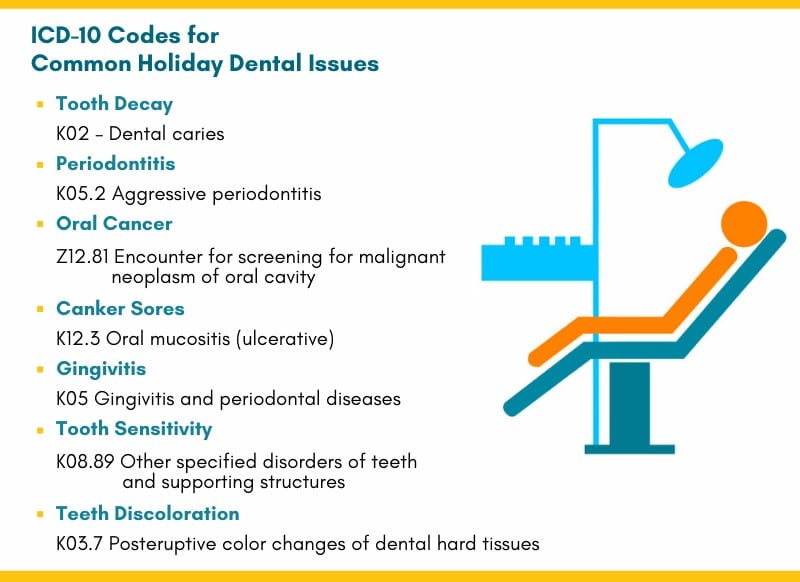Holidays are a great time for get togethers, parties, fun and mainly favorite meals and a sugary diet. Consuming sugary foods and drinks for a prolonged period of time can increase the chances of gum diseases, tooth decay and other dental issues. Most will skip their dental care routines during this time, exposing their teeth to the risk of dental issues. Dental treatments include: filling cavities, periodontal treatments, oral cancer screening, braces, extractions, endodontics, implants, crowns, and more. Dentists, endodontists, orthodontists, or periodontists can rely on an experienced dental billing company to report diagnosis and treatment procedure in dental claims using relevant CDT, ICD-10 or HCPCS codes.
Medical and Dental Codes to Report Common Holiday Dental Problems Tooth decay Tooth decay, cavities or dental caries is a common dental condition caused by a breakdown of the tooth enamel. This issue can be caused by a combination of factors such as bacteria in the mouth, frequent snacking, drinking sugary drinks, and improper cleaning of teeth. ICD-10
- K02 – Dental caries
- K02.3 – Arrested dental caries
- K02.5 – Dental caries on pit and fissure surface
- K02.6 – Dental caries on smooth surface
- K02.7 – Dental root caries
- K02.9 – Dental caries, unspecified
Periodontitis Periodontitis or gum disease is the most common cause of tooth loss in adults. This condition occurs mainly due to poor brushing and flossing habits that allow plaque (a sticky film of bacteria) to build up around the tooth causing inflammation of the gums. Maintaining good oral hygiene is one of the primary methods to keep the teeth and gums healthy and prevent infection. ICD-10
- K05.2 Aggressive periodontitis
- K05.20 …… unspecified
- K05.21 Aggressive periodontitis, localized
- K05.22 Aggressive periodontitis, generalized
- K05.3 Chronic periodontitis
- K05.30 …… unspecified
- K05.31 Chronic periodontitis, localized
- K05.32 Chronic periodontitis, generalized
Oral cancer Overuse of tobacco or alcohol during parties can increase the risk for oral cancer dramatically. Oral cancer develops in the tissues of the mouth or the throat area (oropharynx). Oral cancer screening aims at identifying mouth cancer early and treating the same. Dentists may use additional tests to identify areas of abnormal cells in mouth. ICD-10
- Z12.81 Encounter for screening for malignant neoplasm of oral cavity
- C00 Malignant neoplasm of lip
- C01 Malignant neoplasm of base of tongue
- C02 Malignant neoplasm of other and unspecified parts of tongue
- C03 Malignant neoplasm of gum
- C04 Malignant neoplasm of floor of mouth
- C05 Malignant neoplasm of palate
- C06 Malignant neoplasm of other and unspecified parts of mouth
- C07 Malignant neoplasm of parotid gland
- C08 Malignant neoplasm of other and unspecified major salivary glands
- C09 Malignant neoplasm of tonsil
- C10 Malignant neoplasm of oropharynx
- C11 Malignant neoplasm of nasopharynx
- C12 Malignant neoplasm of pyriform sinus
- C13 Malignant neoplasm of hypopharynx
- C14 Malignant neoplasm of other and ill-defined sites in the lip, oral cavity and pharynx
Canker Sores Aphthous ulcers or canker sores are small, shallow lesions caused by bacteria or virus in mouth. These sores can be simple or complex and can develop in the soft tissues in your mouth or at the base of your gums.
- K12.3 Oral mucositis (ulcerative)
- K12.30 …… unspecified
- K13.7 Other and unspecified lesions of oral mucosa
- K13.70 Unspecified lesions of oral mucosa
- K13.79 Other lesions of oral mucosa
Gingivitis Gingivitis is a common periodontal or gum disease that is mainly caused by poor oral hygiene. Other factors include dry mouth, smoking or chewing tobacco, older age, vitamin C deficiency or genetics. This disease can lead to periodontitis and tooth loss. ICD-10
- K05 Gingivitis and periodontal diseases
- K05.0 Acute gingivitis
- K05.1 Chronic gingivitis
CDT
- D4346 scaling in presence of generalized moderate or severe gingival inflammation – full mouth, after oral evaluation
Tooth Sensitivity Tooth sensitivity is a common dental problem that involves pain or discomfort, especially when consuming ice cream, sweets, hot or cold drinks. In-office treatment procedures for sensitive teeth include Surgical Gum Graft, Root Canal, and Desensitizing Toothpaste. ICD-10
- K08.89 Other specified disorders of teeth and supporting structures
CDT
- D3331 Treatment of root canal obstruction; non-surgical access
- D3346 Retreatment of previous root canal therapy – anterior
- D3347 Retreatment of previous root canal therapy – bicuspid
- D3348 Retreatment of previous root canal therapy – molar
HCPCS
- D4270 Pedicle soft tissue graft
- D4275 Soft tissue allograft
- D4276 Combined connective tissue and double pedicle graft, per tooth
Teeth Discoloration Tooth discoloration is the change in the color of the teeth. There are several causes of tooth discoloration – drinks like coffee and tea, chewing tobacco, poor dental hygiene, certain medications, aging or genetics. ICD-10
- K03.7 Posteruptive color changes of dental hard tissues
Dental insurance verification is an important process that supports timely claim filing and correct reimbursement. Practices can consider dental billing outsourcing to benefit from complete dental billing solutions.





